
Bal Masque
Directed by
John Vreeke
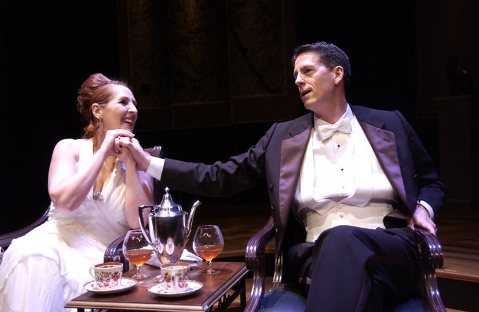 Brigid Cleary and
Jeff Allin
Brigid Cleary and
Jeff Allin
.

'Bal Masque' Curdles The Creme de la Creme
At Theater J, a New Take on the Very Rich
By Peter Marks
Washington Post Staff Writer
Wednesday, April 12, 2006; Page C01
As a social event, it was nonpareil. As the subject of a play,
it's not quite so dazzling a bauble. Still, in "Bal Masque," playwright
Richard Greenberg manages to add amusing colors to his comic
reconstruction of
the hours after Truman Capote's Black and White Ball, the celebrated
fete
to end all fetes.
The play, receiving its world premiere at Theater J, allows
six strong
actors the opportunity to romp in the manicured gardens of Greenberg's
lush
locutions. It has been staged with agility by John Vreeke, who sets a
playful
tone for his skilled performers. All in all, though, black and white
comes
out a little gray. Alternating between satire and pathos, the play
never
settles on a particularly urgent arc, and most of Greenberg's
characters
remain, as a result, rather sketchy. The curiosities about them only
intermittently
pique ours.
With his debut Broadway play "Eastern Standard" in 1989,
Greenberg was dubbed a wunderkind; lately, the wunder has been his
productivity.
"Bal Masque" is one of three new works the 48-year-old playwright is
unveiling this season, and on top of these, Julia Roberts is opening on
Broadway next week in a revival of his 1997 drama "Three Days of Rain."
Washington audiences, meanwhile, got a taste last summer of Greenberg
at maximum throttle with Studio Theatre's mounting of "Take Me Out,"
his lyrical oath of allegiance to baseball.
Theater J deserves a hand just for shepherding this original
play to the stage. Its artistic director, Ari Roth, is confidently
building the company's reputation as a haven for first looks. And even
if "Bal Masque" is a less elegant entertainment than "Take Me Out," the
piece is still flavored with Greenberg's wit. Its inspiration is the
legendary Black and White Ball at the Plaza Hotel, thrown in the fall
of 1966 in honor of Katharine Graham. To have received a coveted
invitation, in those days when Capote reigned as a fey object of
glibness and an exotic kind of fascination, was to have had, in
rarefied circles, one's right to a heartbeat validated.
The play unfolds in the wee hours after the ball, in the
apartments of three couples who attended. They're examples of the types
who reputedly adored or were adored by Capote. Though the diminutive
writer never appears, he's a presence in the play, invoked by all the
characters, especially two women who profess to be among his "Swans,"
the holiest of holies in the hierarchy of Capote confidants.
Greenberg has these women clinging tenaciously to their
status: "I
was the model for Hol --" one of them starts to say before catching
herself, in a reference to Holly Golightly, heroine of Capote's
"Breakfast at Tiffany's." (It must be noted that it is questionable
whether the discreet muses of Capote's acquaintance would ever have
broadcast such a claim so gauchely.) The moment, though, captures the
essence of "Bal Masque," a play that is at heart about America's
enduring fascination with the rich. What's it like to live the soign
é Manhattan life? The truth, Greenberg tells us, is that after
hours, it's just as sad and lonely and tawdry as life for
everybody else. The rich just have more stuff.
In one apartment, a settled older couple (Jeff Allin and
Brigid Cleary),
feeling as if they've been blown aside in the social whirlwind, wrestle
testily
with obsolescence and lethargy. In another, an abstract painter
(Cameron
McNary) goes home with a young socialite (Maia DeSanti), each trying to
determine
how useful the other will be in furthering their aspirations. In the
third
are the wallflower spouses (Colleen Delany and Todd Scofield) of the
couple
in the second apartment, dancing on the edge of a dalliance.
The play, as its title and subject suggest, is also about
unmasking, about the realities that reveal themselves after revelry
dies down. By the final blackout of "Bal Masque," uncomfortable truths
will have emerged
and distasteful secrets been confessed. But Greenberg's emotionally
opaque
narrative doesn't allow us to come to any intimate understanding of
these
people, and so the revelations have no cumulative impact. What does pay
off with more frequency is the drollery of the repartee. The play is
sprinkled
with Greenberg's signature wit; it's not a put-down to say that "Bal
Masque" sometimes plays like a high-end version of Neil Simon's "Plaza
Suite."
The well-chosen actors do manage to seem as if they are
creatures of the exorbitant canyons of the Upper East Side. Scofield,
for example, is wonderfully on the money as a millionaire from Indiana
who's never strayed from Midwestern plain and direct. After he tells
Delany's Joanna that his Fifth Avenue apartment has 13 rooms and she
asks if they're small, he replies matter-of-factly: "Three of them are
small." It's guilelessness that makes the line work. DeSanti is
beguiling as a young social piranha with a wild speech impediment that
can milk a phrase such as "fwail, fwivowous cweature" for laughs.
Delany, too, offers a memorable turn as DeSanti's polar opposite, a
meek thing who's, nevertheless, transgressed in a most deplorable way.
As the older swells, Allin and Cleary are even sweller. A
Cowardesque cloud of bitter irony envelops them as they pick apart the
ball and disclose -- more in the words they avoid than in those they
choose -- the state of their union. Dying for a smoke, they conspire to
steal cigarettes from the room of the sleeping maid, and even after
their mission is accomplished, they can't come up with a match. The
fire in this relationship is most definitely out.
Daniel Conway contributes a functional yet striking set, with
revolving panels that evoke each of the apartments, and costume
designer Kathleen Geldard dresses the women chicly and sleekly. A
recording of Philip Glass's "Glass Pieces" is an urbane bit of
embroidery, too. Although Vreeke and the cast at Theater J have
revealed the play in some satisfying ways, what still
may be in need of some refinement are the ways in which Greenberg's
characters reveal themselves.
Bal Masque , by Richard Greenberg. Directed by John
Vreeke. Sets and lighting, Daniel Conway; costumes, Kathleen Geldard;
sound, Matt Rowe. About two hours. Through May 21 at Theater J, Goldman
Theater at DC Jewish Community Center, 1529 16th St. NW.
Bal Masque
by Richard Greenberg. Directed by John Vreeke.
Trey - Jeff Allin
Greer - Brigid Cleary
Marietta - Maia DeSanti
Owen - Cameron McNary
Joanna - Colleen Delaney
Russell - Todd Scofield
Truman Capote's famous 1966 Black &
White Ball becomes a backdrop for biting social parody and analysis in
Richard Greenberg's cleverly disjointed "Bal Masque," making its debut
at D.C.'s Theater
J. Greenberg's droll wit and linguistic dexterity are fully on display
in
this mostly satisfying piece.
A frivolous mood is set the instant the lights come up on a
society couple seated in their New York living room, both wearing party
masks. He's in a tux and she's in a long, white dress, her mask adorned
with elaborate plumage that bobs with every movement like a restless
bird. They have just returned from Capote's famous Plaza Hotel ball and
are eager to savage all they surveyed.
The conversation is delightfully effete, delivered with
hauteur. It builds slowly from vapid observations about nothingness --
short men, the "elegant prop" of a cigarette -- before turning to the
party's guests and especially its host.
The couple trade diatribes on society's disturbing new era in
which such "freaks" as Capote have suddenly gained the power to dictate
who's in and who's out. Sadly for them, they are out, having been
forced to crash the so-called party of the century to keep up
appearances. "Remember what it was like to be us?" they ask wistfully.
Such is the vein that Greenberg merrily mines in "Masque," the
latest product to drop from his well-oiled conveyor belt. It focuses on
the problems of three ill-suited couples during the wee hours following
the ball. While the party is the common thread, each vignette stands on
its own in Greenberg's sometimes biting piece about changes in the
social order during the turbulent '60s.
Theater J was invited to launch the play because it is
considered one of the nation's top contemporary Jewish theaters, one
that has in recent seasons specialized in new works. In fact, Greenberg
probably couldn't have asked for a better venue. John Vreeke, Theater
J's resident director, has staged the play with a keen eye for the
absurdities being flaunted and the real-life troubles that lie just
beneath them. Carefully crafted scenes are performed with impeccable
timing and delicious bits of comedic movement.
Vreeke has assembled a talented ensemble that revels in
Greenberg's messages of angst. As the act one couple, Brigid Cleary and
Jeff Allin offer a hysterical pas de deux filled with silly moments and
unrepressed anger. Just watching a slouching Cleary guzzle brandy and
coffee chasers between verbal barrages would be worth the price of
admission. Allin is every bit the polished aristocrat ready to seize an
argument and an opportunity.
In act two, the situations become decidedly more tragicomic,
and somewhat less satisfying, as Greenberg dives into the personal
problems of two dysfunctional couples. The characters include one
emotional castoff desperate to grab hold of any solid mooring (a
portrait of insecurity by Colleen Delaney). Maia DeSanti adds comic
relief as a wacky arts patron and self-professed
Capote "swan" with an entertaining speech impediment. Cameron McNary
and
Todd Scofield play the troubled husbands. Play ends with a surprise
Central
Park encounter between two of the male characters.
The picture here isn't so much about cracks in the social
class as
it is about deep-seated issues that cross social boundaries. And while
the
parody of these self-obsessed individuals is at times cruel, a bigger
problem
is that the fluidity of the earlier antics isn't matched by the
decidedly more manufactured mayhem that follows.
But perhaps that's just Greenberg toying with us. He has,
after all,
inventively penned each vignette in a distinctively different style in
this
comic treatise about absolute power. His "Bal Masque" is, on balance,
another
enjoyable entry into his fast-growing canon, one that will be pursued
as
much for its delicious female roles as for his searing insights into
the
upper crust.
Sets and lighting, Daniel Conway; costumes, Kathleen Geldard; sound,
Matt Rowe. Opened, reviewed April 9, 2006. Running time: 2 HOURS.
WASHINGTON TIMES
Finely drawn in Black, White
By Jayne Blanchard
April 14, 2006
Even if you weren't there, you were there. Truman Capote's 1966 Black
and White Ball at the Plaza Hotel was touted as "the party of the
century." An invitation was a prized possession, and even such
luminaries as Tallulah Bankhead had to beg for entry. Frank Sinatra and
his waif bride, Mia Farrow, were in attendance, as was the reigning
peacock, Mr. Capote, with guest of honor Katharine Graham and all his
"swans" -- devoted socialites Babe Paley, Marella Agnelli, Gloria
Vanderbilt, Gloria Guinness, C.Z. Guest, Lee Radziwill and Slim Keith.
For the great unwashed, the masked ball -- the
guests' entrances to which were shown nationwide on television --
represented the last vestige of old-school glamour, a throwback to a
more elegant and decorous era. The Black and White Ball also symbolized
the breaking down of social mores that was to occur throughout the '60s
as downtown artists and writers rubbed dirty elbows with uptown
bluebloods at the Plaza's main ballroom.
Playwright Richard Greenberg explores this
cultural shift, when a self-proclaimed "freak" and social outcast could
rise to unprecedented power, in his intriguing and stylish chamber play
"Bal Masque," a world premiere at Theater J impeccably directed by John
Vreeke.
The play also charts the hatchling days of
celebrity worship, when the world was just beginning to become obsessed
with and give disproportionate sway to A-list and B-list personalities.
Although it probably seemed excessive in 1966, by today's standards,
the star worship seen in "Bal Masque" seems rather innocent and
picturesque.
The play begins as the ball ends, with the
guests returning home to their regularly scheduled lives. Three
vignettes vary in tone and mood, but they share Mr. Greenberg's
lacerating, laser wit and his mellifluous command of language.
The first scene opens with the drop-dead line,
"Well, that was the worst party I've ever been to," uttered with
sangfroid by society matron Greer (a sublime Brigid Cleary). Clad in a
white evening gown and matching feathered mask, Greer flings bon mots
and fondant-ice brickbats
with her black-masked husband, Trey (Jeff Allin, exuding lanky
aristocratic
nonchalance), a touchingly mild-mannered man to a manor born.
At the beginning, Greer seems to be seized by
an exquisite ennui as she picks apart the ball and her marriage, but
then
you realize her manicured claws have come out because she is a former
"swan" snipped from Capote's invitation list. Greer and Trey slinked
around the periphery of the party, within sniffing distance of the
guests. Born with a silver spoon in her mouth, Greer now chokes on it.
Eventually, they remove their masks, and their
real faces become almost a lampoon of comedy and tragedy -- Greer's
frozen in a rictus of good breeding and curdled resentment, Trey's
melting into the lines of softly shocked disappointment.
Mr. Greenberg has given each of these superbly
matched actors a killer monologue, and both are delivered with
devastating clarity -- Trey expressing both genteel rage and
bewilderment as he decries the rising cult of celebrity and Greer
recounting the time when she was one
of Mr. Capote's favorites with the shimmering sexual languor of someone
describing
a former lover.
The second vignette takes on a more antic,
comic tone as the rich Marietta (Maia DeSanti) conducts a suggestive
interview with Owen (Cameron McNary), an up-and-coming artist and antsy
social climber. While the naughty Marietta scampers between being
Owen's art patron and
his lover, her husband, Russell (Todd Scofield), has been entrusted
with
seeing Owen's mousy wife, Joanna (Colleen Delany), home. He also has
been
told to stay away until dawn from their apartment, which, in Daniel
Conway's
chic and flexible set, prominently features a triptych of Andy Warhol
screened prints of Marietta's face.
Miss DeSanti is adorable as Marietta, a
beautiful woman with a speech impediment that turns her into a
patrician Elmer Fudd. She is both precocious and vacuous, a combination
that seems to bewitch Owen, a man hilariously out of his league.
Russell, a gallant fellow with solid Midwestern values, also seems out
of his depths with the fragile Joanna, who seems to have just stepped
out of the pages of a particularly lurid Flannery O'Connor short story.
Miss Delany personifies the excesses of Southern gothic with genuine
pain, never lapsing into melodrama.
The third piece is the shortest and most
hushed, a pre-dawn encounter on a park bench between Trey and Russell.
Each man is, for the evening, without a home or wife, but of course,
they are too well-mannered to cry on each other's dinner jackets.
Instead, they bond over being fellow Princetonians and distant
relatives until this unexpected closeness results in the breaking down
of sexual barriers. Mr. Scofield, who largely reacts in the previous
scenario, gets a chance to show the heartbreak and disappointment
beneath his sturdy persona, and Mr. Allin uses Mr. Greenberg's
high-flown wordplay to devastating effect in his portrayal of a man
restless in a society that once gave him ease and comfort.
Mr. Greenberg's work has begged comparisons to Noel
Coward and Philip Barry, but his plays are more far-reaching and less
self-consciously mannered than theirs. More precisely, Mr. Greenberg's
plays, with their arabesques of language, humane humor and sense of
moral searching, are more closely
aligned to those of Tom Stoppard and Tony Kushner.
"Bal Masque" is an aria for the ears and the
intellect.

April
14, 2006
Bal Masque
By Richard Greenberg
Directed by John Vreeke
At Theater J to May 21
Marietta legs her way into high society.
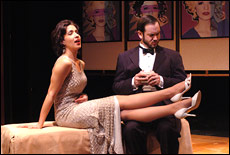 Review By Trey Graham
Truman Capote never appears as a character in Bal Masque—his
name doesn’t come up, in fact, until well into the second section of
Richard
Greenberg’s quietly seductive triptych, and even the first allusion to
him
(something to do with “short men who whinny”) comes roughly a
quarter-hour
down the conversational trail that meanders with such deceptive calm
through
most of the first act. But the notion of Capote shadows the play like
some
malignant spirit, and so sharp is the tang of the playwright’s loathing
for
his unseen main character that you have to wonder: How long has
Greenberg
been nursing this crush?
Because make no mistake, it’s a love-hate thing. Three couples
spend a couple of hours putting a coda on an opera of an evening—it’s
the aftermath of Capote’s notorious Black and White Ball, and the
various characters in Bal Masque have all been to the Plaza Hotel, one
way or another—and the excitement and the exhaustion and the shame that
attends their various wrappings-up are nothing if not acknowledgments
that, like it or not, they’re each of them
in thrall to him. They are all, in their way, the sort of grotesques
Capote
adored: dazzling, some of them, others quietly broken under a perfect
surface,
still others desperate enough that you can see the awfulness coming and
wait,
licking your chops, for Greenberg to serve it up. (And in that
Capote-ish move, Greenberg makes little Capotes of us all.)
It starts slow, this play, in the burnished, low-key
world-premiere production John Vreeke has directed for Theater J, and
that makes a kind of sense once Greenberg drops the clues that tell you
exactly how Greer (Brigid Cleary) and her husband, Trey (Jeff Allin),
have spent their evening. Dressed to the nines, masks still
(significantly) on, they sit nattering about the cigarettes they’re out
of and the unopenable door behind which an emergency stash might be
found. And don’t think closed doors aren’t a hint about where these two
find themselves: Greer has looked to Capote for the titillating
counterpoint he plays against “the elevator music of existence,” as she
puts it in one of those arias Greenberg likes to give characters now
and
again (to his credit, he makes a joke of it here), but recently she’s
not
been getting invited to the recitals. She’s a princess cut off from her
court
jester, and somehow, once Bal Masque lets its party face slip to show
the
humanity behind its characters’ pretty surfaces, Greenberg and Cleary
and
Allin turn out to be gifted enough to make you understand how that
could
be devastating.
Vreeke keeps the performances in that first long stretch so
contained, so controlled, that you almost don’t see how eloquent they
are. Then: a small fidget with the right hand, which draws the
audience’s eye, which makes
it necessary that that hand will be touched—and so it is, and there is
a
moment of immense tenderness that explains all the anger to come. It’s
lovely.
Then the anger comes, and sadness on its heels.
And then it’s on to another expensive Manhattan apartment (the
handsome sets and lighting are by Daniel Conway), the domain of a
delicious creature who all but flaunts the speech impediment that turns
her Rs into Ws, as if to say that on such a gem even a flaw is just
another brilliant facet. She is Marietta (an enchanting Maia DeSanti),
and she is, it will shortly become clear, Capote’s new favorite, his
new “head swan,” the new provider of the gossip that intoxicates him
so—and she’s just narcissist enough, poor dear, to be persuaded that
she won’t one day be a castoff like Greer. (“Poow Gweew,” says our
exquisite, with a giggle so charming you don’t for an instant mind the
knife: “She’s an old swan. She’s molting.”)
With the chair and the whip of potential patronage, naughty
Marietta puts an impoverished Virginia gentleman of an artist (Cameron
McNary) through a series of archly amusing hoops involving the taking
off of shoes and the putting on of an unfortunate peignoir, while
across town her henpecked Midwesterner husband, Owen (a nicely
disconcerted Todd Scofield), does the gentlemanly thing and escorts the
artist’s exhausted wife home. And in a sequence of overlapping scenes
that moves a whit less fluidly than it might, both pairs approach the
precipice of a secret that would, should Marietta tease it out of her
new protégé, be enough to keep Capote in shrieks for a
week. But she misplays her hand (DeSanti and McNary play the misplaying
hilariously), and it falls to Colleen Delany’s tortured Joanna to
confess the secret to Owen—a good guy who, in a wrenching moment, can’t
deliver on the promise of understanding that leads Joanna to confide in
him. The play leaves her isolated, on the outside, a grotesque without
the glamour of being known as a grotesque among those who’d turn her
into a figure of fascination; it’s a measure of Greenberg’s gifts that
you don’t know whether to mourn that
or heave a sigh of relief for the poor woman.
Finally, it’s on to a park bench, where two of the men run
into each
other, nursing their uncertainties and their inadequacies—“I’m told I
vanish
in a mixed light,” one says as the sun threatens to come up, rehashing
a
casual, intimate cruelty from an earlier conversation—and as one of
them nears
an emotional breaking point, the other, in what’s probably the
evening’s only
real act of charity, declines to pass on a bit of meanness that’s been
circulating
since Capote engineered it at the beginning of the evening. And in that
declining,
he creates what might be a glimmer of possibility, a way forward for
both
men. Or perhaps it’s a disastrous move—Greenberg refuses to say, even
to
hint, what the morning after his monsters’ ball may look like.
And since all the play’s quiet seductions are given scope to
whisper and promise, you go home wondering how it is you’ve come to
care for these socialites, these grotesques—these people.
A CurtainUp DC  Review Review
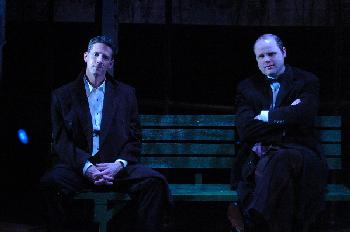 Bal Masque Bal Masque
by Rich See
Theater J's world premiere of Richard Greenberg's Bal Masque is
a witty, urbane and ultimately ferocious deconstruction of one
celebrated night in American pop culture. Centered during the early
morning hours
of November 29, 1966, Greenberg's story looks at the aftermath of
Truman
Capote's famed Black and White Ball.
Mr. Greenberg places his microscope on three couples and the
intertwining of their lives, following their attendance at the masked
party. They include: Trey and Greer, a married duo who are obviously
spouses in name only. Marietta and Russell, a wealthy husband and wife
who have a strained relationship. And Owen and Joanna, an artist and
his wife who appear to have arrived from the backwoods of Virginia. As
everyone ponders the party, we see unraveling psyches obsessing over
either inclusion in Capote's clique and wondering how close they are to
being central to the artist, or how far from their own lives they have
strayed and how dearly they want to return to their true identities.
It's this double use of masques that Mr. Greenberg has so skillfully
employed. While half the cast is hiding behind their masks of
emptiness, hoping to be noticed and validated by the famed writer, the
other half is wishing to remove the facades that they have built their
lives behind, and breathe more freely.
Thus as Greer (a wealthy socialite with very little to do) is agonizing
over the fact that she -- one of Capote's "swans" -- was removed from
the guest list at the last minute, her husband Trey is itching to go
for a long solitary walk through Central Park to "buy a pack of
cigarettes." The truth is, poor Greer has aged and Capote wants to be
cruel, simply because --
he can.
Meanwhile in another apartment, Marietta (a wealthy socialite with very
little to do) has ordered her husband Russell to wander the streets
until sunrise, because she is "interviewing" Owen, an artist whom
Capote has pointed out to her as being ripe for patronage. Russell thus
dutifully escorts
Owen's sickly wife Joanna (a young woman with nothing to do) home,
whereupon,
the mixed pairs begin to have heart-to-heart talks: Marietta and Owen
discussing how much Capote likes them, Russell and Joanna filled with
an inner sadness at being part of hip society.
Mr. Greenberg twists his plot well, so that everyone has a secret they
need to express or are in search of a secret to share with Capote.
Greer is dumbfounded over her exclusion and feels there must be some
secret to why she was not invited and thus "forced" to endure the
entire evening as an outcast hovering by the ballroom door and in the
ladies' room. Marietta is desperate to uncover a secret within Owen in
order to seal her place in Capote's affections. Owen is ecstatic to
concoct a fake secret to improve his image with the writer.
Trey is carrying around his own secret, which accounts for his disdain
for the out Capote who thrives on gossip. Joanna, who appears to be the
most unsophisticated of the group, actually has the greatest secret --
a secret that really would seal Marietta's affection with Capote -- if
only Marietta would take an interest in meek Joanna. And Russell, who
not only has his own secret which would topple Marietta's place amongst
the swans, also knows Joanna and Owen's dark tale. But Marietta,
literally, doesn't have the time of day for the man who happens to be
her husband.
The final scene occurs with Trey and Russell meeting just before dawn
in Central Park, realizing they not only graduated from the same alma
mater and are actually distant in-laws, but also saw each other at the
ball and hated the entire party. After chatting they see they have
something else in common -- a desire to honestly connect without the
facades they have been wearing to protect their stature among the
city's wealthy elite. And this seems to be Greenberg's main point
within the play -- the masks we wear
are of our own creation. We can remove them, they are not forced upon
us,
we simply have to have the courage to take a step forward and reveal
ourselves. Others may not like what we show -- but what does their
opinion really
matter in the greater scheme of our lives?
Director John Vreeke has pulled together a great cast. The timing of
this production is perfect; the tones, inflections and dry wit are
wonderful. Set and lighting designer Daniel Conway has created a
fitting stage that first appears like a great hall in a museum --
fittingly Trey and Greer's empty living room -- which reflects their
empty marriage. Next it becomes Russell and Marietta's posh 13-room
apartment and Owen and Joanna's tiny one-bedroom. The nature scene of
New York City and Central Park is also wonderfully done with lights and
an illusionary backdrop.
Matt Rowe's sound design begins as soon as you enter into the theatre
with the sound of party noise and revelers floating from beyond the
stage. Kathleen Geldard's costumes are chic evening wear with the men
in basic tuxedos and the women in floor-length gowns.
In the cast, Jeff Allin creates a staid Trey pondering his reputation
of conformity. His perfunctory and matter-of-fact delivery belies what
he is really thinking. As Greer, Brigid Cleary is a distraught wife who
knows her husband's secret -- even if she won't admit it to herself.
The
moment when they remove their masks, and their witty banter comes to a
screeching halt as they realize they have nothing substantial to say to
each other, speaks volumes.
Maia DeSanti's speech impaired Marietta is a treat as she offers up
intellectual theories like "So I can be a positive force on society, I
must retrain myself to love what I hate." while simultaneously running
high
heeled circles around Cameron McNary's southern artist. Mr. McNary's
Owen
is an uptight painter who seems to be hiding something darker within
him,
while trying to claw his way into Capote's inner circle, to receive the
crown
prince's blessing and be validated as, not only an artist, but also a
person.
Colleen Delany brings out the rural Joanna's uncomfortableness with
humor and pathos. Each time she nasally says "May I ask you to sit?"
and
then throws out her hands with a slight kneel, there's a chuckle
throughout
the audience. Between frequent trips to the bathroom and a slow build
up
to her revelation, you understand why Todd Scofield's Russ is so
anxious
to run out the front door. (It's easy to forget that this show takes
place
entirely in the early morning hours, which explains Joanna's frequent
trips
to the porcelain god.)
Mr. Scofield's likeable Russ Abbott reveals little about himself, but
it's in what he's not saying that he brings the character alive. By the
time he has arrived in Central Park with Trey, you realize this is a
man
who has no clue who he is or what he is about. He's followed the rules,
listened to everyone else and ended up unhappy in his home life,
disrespected
by his wife and unknowing where he is heading.
All in all, Bal Masque is a great success and a definite treat.
Washington audiences should give this gem a look in its first state --
since there are most likely changes to be made before it reaches New
York -- where, I imagine, it will materialize at some point soon.

Unmasked
Theater J presents the world premiere play 'Bal Masque'
by Will O'Bryan
Director, John Vreeke
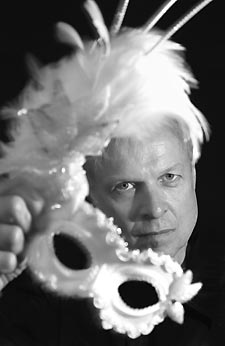 In his 1997 biography of Truman Capote, the
eccentric, gay author whose literary works are regarded as among the
best America has to offer, George Plimpton polled several people about
their recollections of Capote's ''party of the century.'' The 1967
Black and White Ball made headlines. As guest
John Knowles, remembered primarily for his novel A Separate Peace,
told Plimpton: In his 1997 biography of Truman Capote, the
eccentric, gay author whose literary works are regarded as among the
best America has to offer, George Plimpton polled several people about
their recollections of Capote's ''party of the century.'' The 1967
Black and White Ball made headlines. As guest
John Knowles, remembered primarily for his novel A Separate Peace,
told Plimpton:
''I felt as if we were in Versailles in 1788. People were
applauding us in the street as we walked in. We had our masks on....
[W]e were he last of the aristocrats.''
Nearly 40 years later, Theater J is presenting a world
premiere play
by Richard Greenberg that uses the famed Black and White Ball for
context: Bal Masque. But Capote sycophants, be warned.
''If you want some hefty, social statement about Truman Capote
and the politics, the art of the time, you're not going to get it,''
says John Vreeke, the gay director of the new work. ''It's really just
three couples after the ball, talking. That's the story. People love it
for that reason, or they're disappointed because they expect a far more
juicy, outrageous story about the Black and White Ball and Truman
Capote.''
Instead, says Vreeke, audiences get a play staged in three
very different
parts -- not acts -- with inspired dialogue, precise stage direction,
and
an examination of human relationships that can stand on its own legs,
rather
than Capote's.
''The context of the play was not as important for me as
understanding the individual characters and their relationships,'' says
Vreeke.
Vreeke's own relationship with the play seems to have humbled
him, in that he offers abundant praise for Greenberg's writing, saying
that the playwright's attention to detail made it difficult to leave
much of his
own mark on Bal Masque.
''I get immense enjoyment from something that demands more
directorial interpretation, which is not Bal Masque,'' Vreeke
shares. ''At the same time, I will always drift toward the strongest
writers. Greenberg's writing is extremely careful, precise, gifted. I
just followed the stage direction
and followed the rhythm of the language.''
DC Theatre Scene
Review by Tim Treanor
Unmasqued. After the Bal
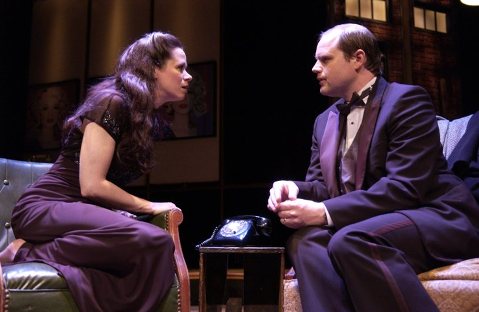
There was a time, in the nineteen sixties, where it seemed we
had come to the end of the world. The muscular optimism of the Kennedy
years had closed, literally, with a bang. Hemmingway, who represented
all that was swagger in the literary arts, had come to a similar end a
few years earlier. Justice and international liberty, seemingly at hand
through legislation and a show of force in the Gulf of Tonkin, was
proving to be harder and more elusive. Our assumptions had been
critically flawed. The days brought humility, and for some, despair.
In retrospect, it should not be surprising that a human
vampire emerged
as a hero in those difficult days. Truman Capote, a fat, unsocialized
alcoholic
with a gift for the telling phrase and a genius for self-promotion
served
the bill nicely. His breakout accomplishment was a "nonfiction novel",
In
Cold Blood, about the massacre of the Clutter family in Kansas. By
calling his work nonfiction, he gave himself license to spread the
lives of these unfortunate people and their killers before the general
public. By calling it a novel, he avoided the requirement that it be
true.
Literary fame was insufficient for Capote; he required social
renown as well. Towards that end, he staged an enormously publicized
social event, the "Black and White Ball", whose cachet he cleverly
enhanced by maintaining an ostentatious, but secret, guest list, to
which he constantly added and subtracted.
In retrospect, it all seems as foolish and faddish as hula
hoops, but it was deadly serious at the time. Mystifyingly, Capote had
acquired a reputation as an artistic as well as social arbiter, and to
be invited to
the Black and White Ball could mean hundreds of thousands of dollars to
an
aspiring artist. For the New York Social Set, an invitation could
assure recognition
and reputation for a decade; exclusion meant a death spiral of B-list
parties
which would eventually end up with the defunct socialite spending her
evenings
in front of the television, watching Matlock reruns.
It is this ball - the Bal Masque of the title -
which forms the backdrop for Richard Greenberg’s incandescent play,
receiving its world premier at Theater J through May 11. The
astoundingly prolific Greenberg, who has had four world premiers this
year and whose Three Days of Rain, which stars Julia Roberts, is
playing to packed preview houses on Broadway, here identifies with
laserlike precision a society whose moral center has drained away, and
is thus reduced to pandering and sycophancy.
Greenberg’s dialogue sings and sizzles, and director John
Vreeke has assembled a high-octane cast which is the equal to it. Greer
(Brigid Cleary) is a onetime "swan" of the master - a sort of deputy
Capote who gathers the gossip he loves and feeds off of in return for
outrageous compliments (Capote loved to tell people they were the
models for the characters in his
novels) and ersatz approval. She has committed the sin of growing
older, however,
and she and her bewildered husband Trey (Jeff Allin) are thus forced to
orbit
the party like human Plutos, glimpsing the Great Man only occasionally.
As
the play opens, they nurse their wounds over brandy and coffee,
alternately cursing Capote and whining because they have no cigarettes.
Greer, cut off from Capote’s wellspring of malice, sprays a fine mist
of acid at Trey, making insinuations about his intelligence, his
imagination, and his sexuality. Trey strikes back as best he can.
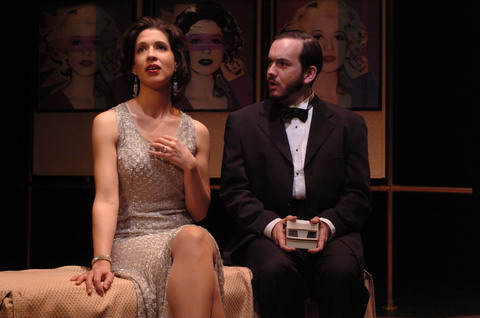
Greer eventually sends Trey out to steal cigarettes from the
maid, and once he is gone, launches into a monologue of heartrending
pathos. Greer’s cry of separation from Capote sounds like the wail of a
lost soul, and
when she describes the pathetic emptiness of her life before she joined
his coterie she resembles nothing so much as a reformed sinner who has
found,
and now lost, her Redeemer.
The religious undertones continue in the Second Act, where
Marietta (Maia DeSanti), Capote’s self-proclaimed "head swan",
dismisses her time before Capote as "B.C." Marietta sets out grimly to
seduce Owen (Cameron McNary),
a grade-Z artist and a preposterous fraud. Marietta is an astonishing
creation,
gifted with a truly staggering speech impediment which makes her sound
like
Catherine Deneuve channeling Elmer Fudd. Speech impediments, of course,
aren’t funny but when one is superimposed on a personality as
supernally evil
as Marietta’s, the effect is breathtaking. "You don’t have a home until
dawn,"
Marietta barks at her husband Russell (Todd Scofield), a knowing
cuckold. The line is heartbreaking, but hearing it delivered in
DeSanti’s lisping, cartoony voice is surreal.
Russell is cuckolded, of course, not with the ridiculous Owen
but with Capote himself. Though Marietta is willing to have sex as a
matter of course, her real object is to obtain some secret of Owen’s,
some tidbit of gossip that will briefly amuse the Great Man. When it
finally comes - not from Owen but from his frightened wife (Colleen
Delany) it is so shocking that I could literally hear the breath being
sucked from the audience.
Endings are hard, and it is a measure of the high quality of
this piece that the brief coda that concludes the play fails to fully
satisfy. Graceful and knowing, it nonetheless is a shade too facile,
and suggests a resolution that the rest of the play failed to prepare
us to understand. But - My God! What a piece of work this play is!
Indeed, a description of the play does not do justice to how
funny it is. The wit is so subtle, so complex and dry, that it is hard
not to be flattered to hear it. Time and again, Theater J’s Goldman
Theater roared with laughter - five or ten seconds after the clever
line was delivered.
The play’s success is due in large part to Vreeke’s
rapid-fire, spot-on
direction and to marvelous performances, particularly by Cleary, Allin
and
DeSanti. Indeed, the dialogue-heavy first Act, delivered almost
exclusively
by a man and a woman sitting in chairs facing the audience, could have
been
deadly in the hands of lesser actors. Vreeke showed that he has the
precision
to handle Greenberg’s demanding requirements. He frequently has his
actors
come in on top of each other; and at other times has them stare at each
other
in silence, and never, never is there a false moment.
That Theater J is the site of a world premier of a terrific
play by a significant and well-recognized playwright is a tribute to
the standing that this sturdy, mid-size company has achieved. It is
also a tribute to Washington theater generally. Theater J, one of the
area’s most cerebral theaters, offers a series of lectures and
discussions about the play.
April 3 - May 21, 2006
Bal
Masque |
Reviewed
April 8
Running time 2:20 - one intermission
t
A Potomac Stages pick for sparkling
dialogue
delivered with style
|
The world premiere of a play by Richard Greenberg, one of the hottest
playwrights working right now, is an important event. The fact that it
is being done at (and by) Theater J right here on 16th
Street is an important milestone in the development of that theater
company.
However, the reason to go see it is that it is just plain fun to watch.
It may not pack the emotional power of Greenberg's Take Me Out, or the depth of
character
of his The Dazzle,
but
it offers a dazzling display of delightfully literate repartee
delivered with stylish grace by a cast of six who work well as three
pairs – well, four pairs actually, given the final twist of an epilogue
that mixes and matches a bit differently.
Storyline: Three
couples have returned home in the wee hours of the morning following
Truman
Capote's legendary 1966 Black and White Ball at New York's Plaza
Hotel. Not all have returned to their own apartments, however. One
couple,
who crashed the party, is at home. The others have switched partners
for a while, although not always with the intention of intimacy. All
six have found the evening much less satisfying than they expected.
They
think the fault must be in their own lives, not in any failing on the
part of Capote or the literati assembled at "The Party of the Century."
Of course, that would be unthinkable.
When Richard Greenberg
gets fascinated by something, the result usually ends up on stage in a
form that is fascinating for the audience. Here his interest is in the
party for something less than 600 people in the ballroom of the Plaza
Hotel which was ostensibly to celebrate the publication of Capote's
groundbreaking hit journalistic novel "In Cold Blood," but turned out
to be much more a celebration of celebrity. Greenberg uses the occasion
to explore the fascination that fame and its accompanying power can
have for those who don't have it. Many of the characters here have
expected this night of all nights to be a defining point in their
lives. None has liked what
they got. They do talk about it with great aplomb, however, exchanging
quips and bons mot at a furious pace. Taking place as it does in what
Frank Sinatra sang about as "the wee small hours of the morning" and
among people who have had a most exhaustive, if not completely
exhausting evening, it is amazing that any of them can rise to the
literate expectations of their partners and keep up the level of
banter. But they can and they do.
How wonderful to see
Brigid Cleary back on this stage delivering lines that match the level
of her craft. She opened Tony Kushner’s Homebody/Kabul on this stage
under director John Vreeke with
a monologue of memorable impact. Now, with the same director, she opens
Greenberg’s latest with a dialogue scene shared with Jeff Allin. It has
the same hypnotic effect of setting the entire tone of the evening.
Allin adds a laconic touch of class to the scene, especially during the
first half when the two are
masked. When they remove their masks, somehow the magic of mystery is
diminished. But, then, isn't that the point? Maia DeSanti manages to
keep the speech
impediment of her character from being either her sole defining feature
or
a cheap gag, while Todd Scofield is subtly superb as her husband, a
millionaire
from the Midwest where people don't necessarily care quite as much
about
the cult of personality as they do on the Upper East Side of Manhattan.
Colleen Delany is both funny and touching as the wallflower he has
accompanied home
because they seem to have been left behind by their respective spouses.
Cameron
McNary is the artist who may or may not be reading patron of the arts
DeSanti's
intentions correctly.
A sense of stylishness
permeates
the production and it is isn’t limited to the work of the author and
the
actors. All the design elements contribute as well. Kathleen Geldard’s
costumes, especially those for the ladies, capture the glitter of the
characters’ pretensions with unerring accuracy. The masks go a long
way toward establishing each character’s expectations for the evening.
Daniel Conway has designed an elegant set with rotating panels that
switch from Jackson Pollack-style paintings and modern sculpture to
exposed brick and bric-a-brac. The feel is right and helps the cast
make
the most of the material. All in all - what a kick!
Written
by Richard Greenberg. Directed by John Vreeke. Design: Daniel Conway
(set and lights) Kathleen Geldard (costumes) Suzen Mason (properties)
Matt Rowe (sound) Stan Barouh (photography) Delia Taylor (stage
manager). Cast: Jeff Allin, Brigid Cleary, Colleen Delany, Maia
DeSanti, Cameron McNary, Todd Scofield.
|
|



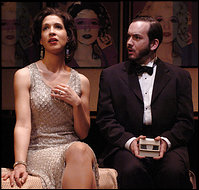


 Bal Masque
Bal Masque
 In his 1997 biography of Truman Capote, the
eccentric, gay author whose literary works are regarded as among the
best America has to offer, George Plimpton polled several people about
their recollections of Capote's ''party of the century.'' The 1967
Black and White Ball made headlines. As guest
John Knowles, remembered primarily for his novel A Separate Peace,
told Plimpton:
In his 1997 biography of Truman Capote, the
eccentric, gay author whose literary works are regarded as among the
best America has to offer, George Plimpton polled several people about
their recollections of Capote's ''party of the century.'' The 1967
Black and White Ball made headlines. As guest
John Knowles, remembered primarily for his novel A Separate Peace,
told Plimpton: 

